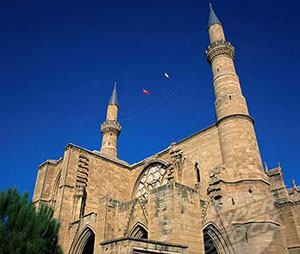The news that an International Conference by the OIC on ‘Islamic Civilization in the Mediterranean’ was held in December, 2010 in Northern Cyprus (TRNC), delighted me.
This is the place which needs real attention by the OIC as Muslims form 98 per cent of the population of this Island state.
I had an opportunity to visit this scenic Mediterranean country last year when the government of northern Cyprus flew in over 51 international journalists from 24 countries for the Peace and Freedom Day, also called the 20 July celebrations, in Lefkosa (Nicosia). It was on this day in 1974 Turkey helped the Island state from the atrocities of Greek Cypriots (Christians).
An island in the far eastern Mediterranean Sea, below Turkey and to the west of Syria, Cyprus is actually two countries – the Turkish Republic of Northern Cyprus (recognised only by Turkey and covering just over a third of the island), and the southern Republic of Cyprus. Cyprus is divided by a UN-patrolled buffer zone, called the Green Line, which snakes east-west across the countryside and symbolically slices the walled capital Nicosia in two.
Though it is a Muslim country yet it does not look like one as the culture adopted does not assimilate with Islamic ethos, etc. That is one very serious issue which should be addressed as there are very few mosques and very few Muslims who pray. The Turkish Cypriots, as the residents are known, have no or little idea about Islamic beliefs, values, rituals, etc.
The main masjid in north Cyprus, Selimiye Camii masjid (built in 1326), is a product of the finest Gothic workmanship harmonious in its proportions, incorporating the elements of Ottoman architecture. I visited this splendid masjid during Asr prayers where I saw a few tourists, including women, inside admiring the architectural elements of the interiors! I was there for more than an hour and I could see one or two namazis during the peak Asr time. Hijab, it seems, is alien in this part of the world. People are very nice and warm yet the vital link of Islam is missing in their lives. How I wish some organisation visit this beautiful country and teach them the basics of Islam.
That is one part of the problem. Another problem dogging the Island is the political isolation from the international community which only recognises the south Cyprus (controlled by the Greeks and fully supported by the EU, obviously) as the legitimate government. From our journalist sources I am told that UN Secretary-General Ban Ki-moon will bring together Turkish Cypriot President Dervis Eroglu and Greek Cypriot leader Demetris Christofias in Geneva next month in a move to find a solution to decades-long Cyprus problem. I was there in Cyprus for about five days and have riffed through reams of documents on political problems and visiting places of atrocities committed on Muslims of north Cyprus by the Greek Cypriots.
We met Mehmet Ali Talat, then president of the TRNC, who observed thus: ‘In 1963, Greek Cypriots resorted to violence in line with its pre-conceived plan and usurped the state machinery by ejecting the Turkish Cypriots partner from all organs of the government by force and arms. The Turkish Cypriots are enduring decades of unforeseen cruelty, bloodshed and suffering.’
We were also given a reception by Huseyn Ozgurgun, minister of foreign affairs of TRNC, who said, ‘Throughout the years we have managed to nurture our young Republic through limited means and turned into a safe haven for our people. In doing so, we have always extended peaceful hand of friendship to the Greek Cypriots and always adhered to the principles of maintaining good neighbourly relations with south Cyprus. The same cannot be said of the other party which continues its policy of alienating us from the international community.’
One day we visited Gazimaguza (also called Famagusta), one of the most ancient ports in the Mediterranean with great historical significance. It was witness to many events of significance. It was indeed sad to see the sight of a mass grave which contains bodies of Turkish Cypriots (Muslims) massacred by the Greek Cypriots in 1964. Such harrowing tales are not rare to find on this Island.
Notwithstanding the amount of torture these people have undergone yet they are ever ready to shake hands with the Greek Cypriots and want peace writ large on this sun-kissed Island.
The current president Eroglu recently gave a clarion call, “We call on Islamic countries and organisations to keep their words by starting political, economic and cultural cooperation with Turkish Cypriots.”
Many Muslim countries have all along been talking of helping north Cyprus economically and politically but besides Turkey nothing much is seen on the ground. Its economy survives on tourism. Its six international universities (www.studyinnorthcyprus.org), with students from 68 different countries, and faculty members from 35 countries, and more than 40,000 graduates in different fields are quite sought after.
The OIC should further push for a reconciliation between north and south Cyprus lest the north side suffer further economic disaster.
[AFTAB H KOLA works for Times of Oman, Muscat as a senior journalist. He can be contacted at [email protected]]


